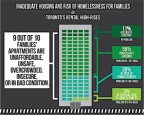Nowhere Else to Go: Inadequate Housing & Risk of Homelessness Among Families in Toronto’s Aging Rental Buildings, by Emily Paradis, Ruth Marie Wilson, and Jennifer Logan, Research Paper 231, Neighbourhood Change Research Partnership, University of Toronto, March 2014.
This report explores the continuum of inadequate housing, risk of homelessness, and visible homelessness among families in Toronto. Low-income families often move between different points on this continuum, and homelessness among families is more likely to be hidden than visible. Drawing upon a survey of families living in aging rental apartment buildings in Toronto’s low-income neighbourhoods, and on focus groups with parents and service providers, this study examines the relationship between housing conditions and homelessness. The findings show that large numbers of children and parents are living in precarious, unaffordable, poor-quality housing. The report recommends four key interventions that can improve families’ access to safe, stable, affordable, and suitable housing.

Paradis etal 2014 Risk of Homelessness Toronto Rental SUMMARY
Highrise hell for low-income families in Toronto | Toronto Star | March 2014
Toronto’s Aging Rental Highrise Buildings | NCRP Research Update | Nov-2013
CBC Toronto Metro Morning Interview with report co-auther Emily Paradis (7 minutes)
———————-
Research funded by the Government of Canada’s Homelessness Partnering Strategy, and the Social Sciences and Humanities Research Council of Canada through the Neighbourhood Change Research Partnership at the University of Toronto’s Factor-Inwentash Faculty of Social Work.
Emily Paradis, PhD, is Senior Research Associate, Factor-Inwentash Faculty of Social Work, University of Toronto. An activist, researcher, advocate, and front-line service provider with women facing homelessness for 25 years, her scholarly work focuses on homelessness among women and families, human rights dimensions of homelessness and housing, community-based research and action with marginalized groups, and participatory interventions to address socio-spatial inequalities between and within urban neighbourhoods. She is Project Manager of the Neighbourhood Change Research Partnership.
